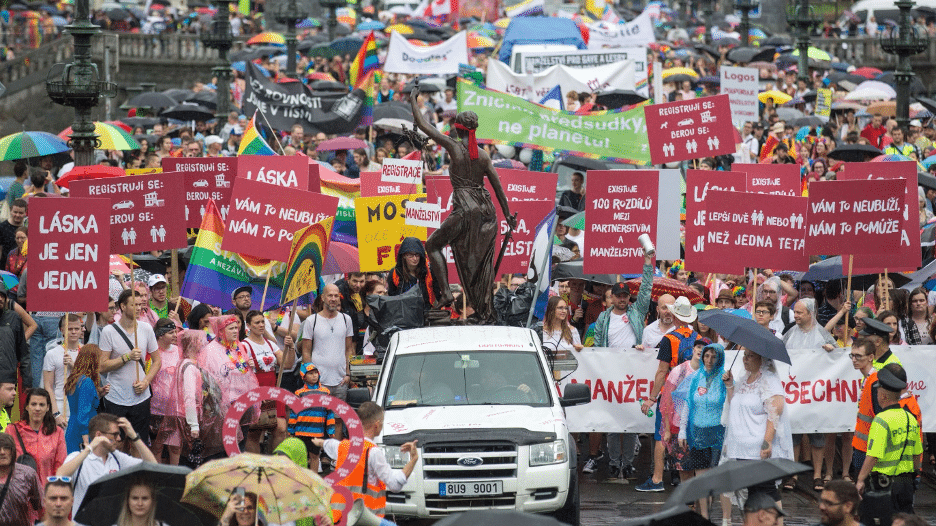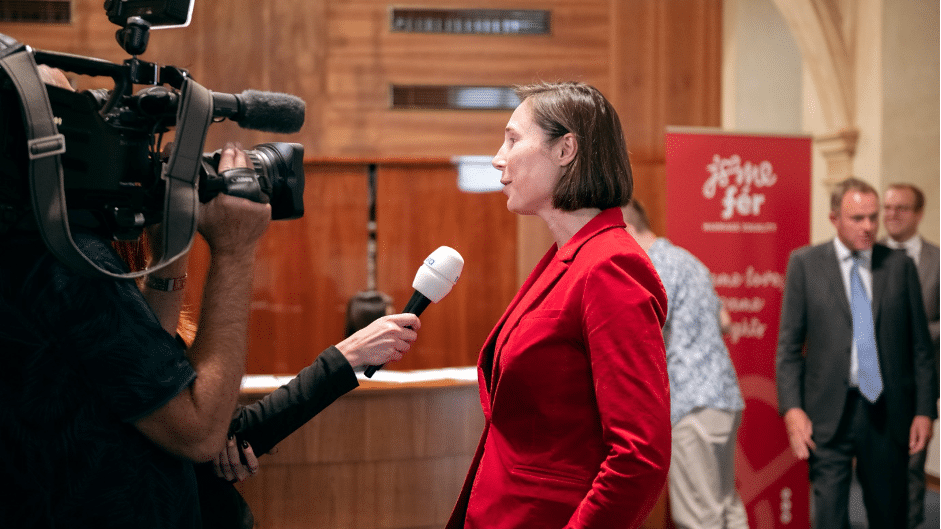From passive tolerance to acceptance
Czech activists fight to bring LGBT rights out of closet.
Regularly branded as the most progressive of the former Eastern Bloc countries, the secular Czech Republic still has some way to go to fully embrace LGBT rights, local activists warn.
“Honestly, I wish there were no need for me to do this kind of work, but when I saw how the Czech Republic was stalling, I knew I had to get involved,” said Adela Horakova, a former lawyer who decided to drop her career to join Jsme Fer (We Are Fair), a coalition of six local organisations advocating for LGBT rights in the country.
Launched in 2017, the volunteer-based Jsme Fer network has already gathered more than 100,000 signatures for its petition calling for the legalisation of same-sex marriage in the Czech Republic. But over two years after an amendment to the Czech Civil Code was submitted to parliament by MPs from six different parties, nothing has changed. “It’s absurd,” Horakova lamented. “The bill for the legalisation of same-sex marriage is becoming known as ‘one of the oldest bills’ in parliament. Legislators have a duty to vote on any law submitted to them, not sweep it under the carpet.”
Blaming a lack of political will from the ruling ANO party despite Prime Minister Andrej Babis’s personal support for the bill, Horakova noted that most of the major Czech political parties remain divided over the issue and would rather keep internal differences at bay. “The Czech Republic is still stuck in the past,” she said, adding that the chances of any change to the status quo before October’s parliamentary elections are becoming slimmer.
With support for same-sex marriage hovering around 60 per cent of the population, the Czech Republic could easily be portrayed as in the avant-garde of the former Eastern Bloc in terms of LGBT acceptance. Homosexuality was decriminalised in 1962, earlier than even in many Western European countries, while pro-LGBT organisations have been flourishing since the early 1990s.
However, according to Michal Pitoňák, head of Queer Geography, the scientific arm of Jsme Fer, these promising figures and long history of activism do not necessarily reflect active support among the population today. “The Czech Republic is highly apathetic towards the issue of sexual minorities. The average Czech doesn’t see LGBT rights as a daily concern or topic worth discussing,” he explained. “Most Czechs believe LGBT people already have enough security and that current laws are sufficient.”

March for equal marriage rights at the Prague Pride 2019 with Lady Justice leading the crowd. Photo: © Jsme Fer
Those laws include registered partnerships, which have benefited more than 3,600 gay couples since coming into existence in the Czech Republic in 2006, as well as a 2016 ruling by the Czech Constitutional Court allowing individuals in registered partnerships to adopt.
Double-edged sword
According to Pitoňák, who pioneered the academic field of queer geographies in the Czech Republic, this widespread belief among the Czech population that LGBT people are already well served paves the way for the current inertia and general lack of interest. “Most Czechs are more comfortable ignoring LGBT people rather than acknowledging their existence,” he noted.
Prague Pride, also a founding member of the Jsme Fer coalition and whose 10th edition was mostly held online last year due to the COVID-19 restrictions, is undoubtedly the most visible and well-known event meant to challenge that general sentiment of benevolent indifference towards LGBT issues.
“For many years, LGBT organisations were careful regarding their public exposure. But events like Prague Pride are here to remind the population that we’re here and are also key to educating the population and media on the challenges faced by LGBT people in the Czech Republic,” Pitoňák explained.
“But visibility is a double-edged sword,” he warned, saying that while initiating a public debate on LGBT rights in the Czech Republic is crucial for increasing public awareness and understanding, greater public exposure could also lead to the politicisation and weaponisation of the issue, as observed in countries like Poland and Hungary.
“Compared to the rest of the Visegrád Group, the Czech Republic evidently is in a better situation in terms of LGBT rights and environment,” accepts Zaneta Sladka from Amnesty Czech Republic, Jsme Fer’s human rights-oriented organisation and “heterosexual brand” as she calls it, in comparison with the five other founding NGOs which are all focused on LGBT rights.
“But more than one-third of LGBT people here still feel discriminated against or harassed. The general public tends to see the situation of Czech LGBT people much more positively than the reality,” she said, pointing out the Czech Republic is one of the few EU countries that still requires transgender people to undergo life-altering surgical procedures to legally change their gender.
One of the reasons put forward to explain Czechs’ relatively high acceptance of LGBT people is the country’s strong secularism. “The relation between religion and LGBT tolerance is more complex,” explained Pitoňák. “Research shows that negative attitudes and opinions towards LGBT people are not linked to people’s religious faith per se, but rather to church attendance. As an institution, the Church has little sway in the Czech Republic, but the influence of individual priests on their parishioners is critical.”
That’s where Logos comes in. Another founding member of Jsme Fer, Logos is a religious civic organisation tasked with initiating a dialogue with churches across the Czech Republic on equal rights and gay marriage. “We’ve managed to create friendly relations with a number of parishes and religious orders, including Protestant and Hussite churches,” former Logos head Stanislav Kostiha told BIRN.

Jsme Fer lawyer Adela Horáková being interviewed at the Czech Senate. Photo: © Jsme Fer
“We’ve faced more resistance from the Roman Catholic Church, where a number of priests and bishops privately support our cause, but shy away from saying so in public, mainly from fear of alienating the more conservative wing and higher echelons of the Church,” he explained.
Breaking down the rainbow wall
Despite the activism and radical views advocated by a number of “pro-family” organisations, the Czech Republic doesn’t appear to be at risk of following in the footsteps of Poland and Hungary, where LGBT communities have been targeted by governing parties as part of their self-avowed “culture war” to defend traditional Christian values.
“What I’m most afraid of is the danger of a long, unfulfilled debate,” said Kostiha. “It’s already visible today, with a number of Czech politicians using the current stalemate to justify more inaction, essentially saying: ‘We always hear about this issue of equal marriage. It’s tiring, and there are more important issues at hand’.”
From Prague Archbishop Dominik Duka’s attacks against the “Satanist, totalitarian [LGBT] ideology”, to President Miloš Zeman’s promise to veto a same-sex marriage bill, the Czech Republic has no shortage of high-ranking outspoken opponents of LGBT rights, and several Jsme Fer activists contacted by BIRN are worried Prague might slowly find itself emulating its V4 neighbours.
While public opinion in favour of LGBT rights has clearly improved over the past few decades, the “Rainbow Wall” remains. Despite high hopes among activists for the Czech Republic to break down that barrier, the title for the first former Eastern Bloc country to legalise same-sex marriage is still up for grabs.
“Ultimately, it all boils down to the most fundamental question,” summed up Pitoňák. “Do I know someone who is gay or LGBT? In the Czech Republic, around 30 per cent of the population would answer affirmatively. This is the real fracture in Europe: whether you know such people or not. This is when it stops being an abstract concept and, more importantly, when it stops translating into a division between ‘us’ and ‘them’.”
First published on 13 January 2021 on Reportingdemocracy.org, a journalistic platform run by the Balkan Investigative Reporting Network.
This text is protected by copyright: © Jules Eisenchteter / Reporting Democracy. If you are interested in republication, please contact the editorial team.
Copyright information on pictures, graphics and videos are noted directly at the illustrations. Cover picture: Participants at the Prague Pride parade in downtown Prague, Czech Republic, 10 August 2019. Photo: © Michal Cizek / AFP / picturedesk.com